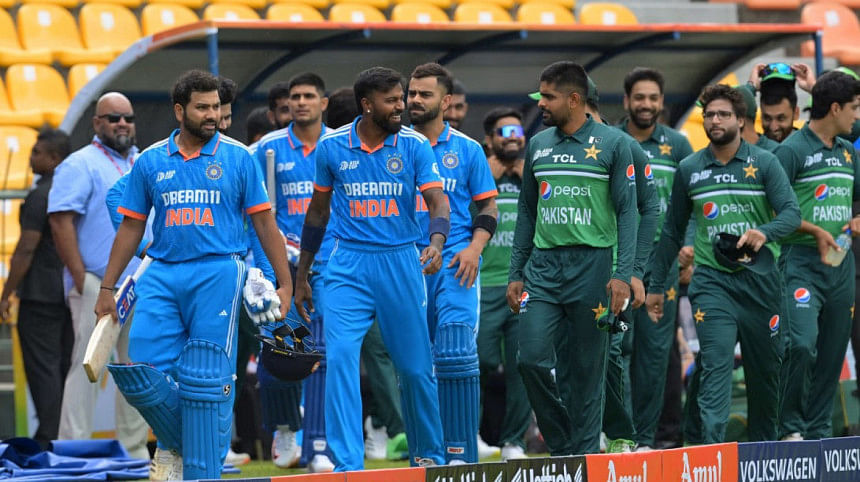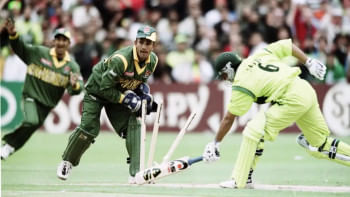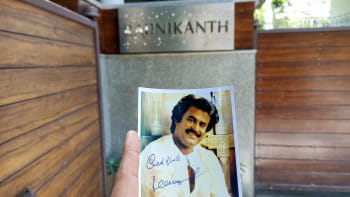The big business of India-Pakistan cricket

There is no doubt that the India-Pakistan contest is the biggest rivalry in cricket, at least in terms of the eyeballs it attracts. The Ashes has a good shout when it comes to history, but the politics and drama that surrounds the buildup to any India-Pakistan match these days is unmatched by almost anything else in sports, let alone cricket.
The theatre is great for the sport. While T20 thrives and the health of One-Day and Test cricket is discussed the world over, it's refreshing to see that India and Pakistan taking on each other can draw attention across formats. It's more than refreshing for the sport's administrators, who seem to have discovered the potential of this rivalry as a cash cow, and are prepared to milk it for all it's worth.
We can get an idea of the amount of money being thrown at the World Cup match that's about to take place between these South Asian rivals in the 132,000-seater Narendra Modi Stadium in Ahmedabad, India, by looking at the prices of tickets in the resale market. The authorities released tickets in tranches, hoping to widen access to as many people as possible, but every time tickets were released, they were sold out within minutes. In September, tickets were going for as much as 55 lakh rupees in the secondary market. The Indian Express reported that individuals have been apprehended for selling fake tickets for up to 20,000 rupees. This just goes to show how much money people are willing to spend to be at the stadium, making it mind boggling to even imagine how much money is being made by the organisers.
Speaking of the organisers, this may be the ICC Cricket World Cup, but it's being held in India. The Board of Cricket Control in India (BCCI) have turned India into the financial epicentre of cricket in the last decade or so, which has given it something of a free reign when it comes to administering the sport.
With power, however, comes responsibility, and also the ability to throw your weight around. While the inclination to make every penny possible from the India-Pakistan rivalry remains strong, the political tension that has sustained between these two countries since 2008 has meant that neither country's cricket team has toured the other in over a decade.
That has resulted in a steep decline in the supply of the most exciting product in cricket, the India-Pakistan match. And this is where the moneymakers have shone. With the lack of bilateral series, ICC competitions and Asia Cups have become the only events where the matches can take place.
Possibly by luck, but probably by design, the teams have managed to meet in every ICC event and Asia Cup after 2010, and the format of the last three Asia Cups have meant that two India-Pakistan games are all but guaranteed. If both the teams turn up for the final, a third India-Pakistan game is also on the cards. While the guarantee of a sporting spectacle such as this is great news for broadcasters and sponsors who are waiting with their bags of money, it does put into question the integrity that is the bedrock of professional sports. Simple rules of probability dictate that at least once or twice in more than 10 years, a cricketing event could take place where the teams don't meet.
Things took a turn for the comical in the recently concluded Asia Cup in Sri Lanka. For starters, the tournament was supposed to take place in Pakistan. Political sentiments in India meant that the government in that country was wholly uncomfortable with the idea of the cricket team travelling to Pakistan. Pakistan retaliated by saying they wouldn't go to the World Cup in India, but India, being the richer and more powerful country in the world of cricket diplomacy, won this contest. They moved all their group games and the whole second phase of the tournament to Sri Lanka, where a monsoon was in full swing. The first India-Pakistan game was washed out by rain, and when a second game was about to get washed out too, administrators met for an emergency meeting and decided that only the India-Pakistan game would be given the privilege of having a reserve day. If rain interrupted this game too, a second day would be available to finish this one-day game.
The integrity and fairness that may have been brought into question before this were truly thrown out of the window, when other teams in the tournament realised that their matches mattered less than the game between India and Pakistan. Everyone openly admitted that this was the game that makes the most money, so this is the one that deserves a reserve day. Business won the day, and bankers celebrated with their suits and briefcases.
Fast forward to the World Cup, Pakistan's threat of not travelling to India has proven to be empty, and the India-Pakistan game once more is the one that has captured everyone's attention. The BCCI was criticised for not holding an opening ceremony at the beginning of the tournament, so they rectified that by announcing a pre-game show before the India-Pakistan match at Ahmedabad, with superstars like Amitabh Bachchan, Rajinikanth, and Arijit Singh set to attend. Supporters say that this means the BCCI listens to supporters, that they actually wanted to hold multiple such ceremonies, but have been limited to just one. Critics, on the other hand, are saying that it's just another ploy to get more screen time out of the already highly saleable prospect of an India-Pakistan contest.
This rivalry is a spectacle of sports, and no matter what happens on the pitch, it's guaranteed that over a billion people across the world will be tuning in. The love of the game, in this instance, may not be strong enough to melt the glaciers of political deadlock and play regular bilateral games, but business is good enough for everyone to sit back for once and allow proceedings to unfold. At the end of the day, a game will be played, pockets will be lined, and as fans, our eyes will be glued to the screen.
Azmin Azran is the editor of Campus and Rising Stars at The Daily Star.
Views expressed in this article are the author's own.
Follow The Daily Star Opinion on Facebook for the latest opinions, commentaries and analyses by experts and professionals. To contribute your article or letter to The Daily Star Opinion, see our guidelines for submission.

 For all latest news, follow The Daily Star's Google News channel.
For all latest news, follow The Daily Star's Google News channel. 










Comments